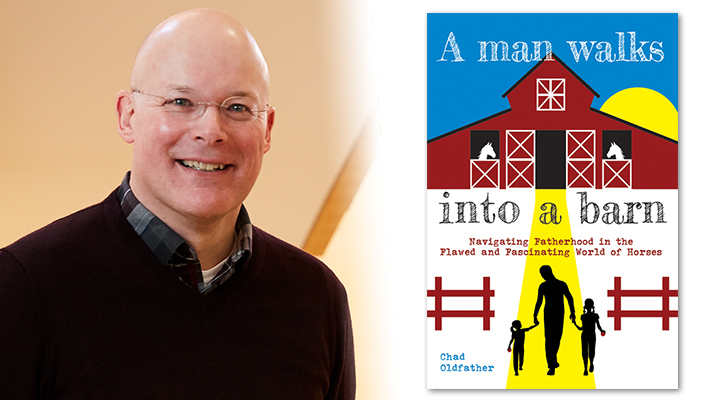By Chad Oldfather, professor of law, Marquette University Law School

“A Man Walks into a Barn: Navigating Fatherhood in the Flawed and Fascinating World of Horses” is available as of Tuesday, March 22, from Trafalgar Square Books.
A book for parents, whatever their children’s interests, and for equestrians, who know what it’s like “on the inside” (but maybe not what it’s like on the outside, looking in), A Man Walks into a Barn is a wise, witty, and, at times, critical look at both the light and dark sides of youth sports, and equestrianism in particular. Readers find themselves rooting for Chad Oldfather as he struggles to be the best dad he can, supporting a child’s dreams in the face of long odds and extraordinary expenses. He writes about his parenting choices and the strange world he finds himself in with humor and honesty, critically examining riding’s high cost and the inaccessibility and inequality that results. Aware of the flaws and dangers of youth athletics, as well as the benefits, he strives to protect his girls while supporting their ambitions the best ways he knows how.
Learn more or purchase this book at Trafalgar Square Books
Prof. Oldfather answered some questions about his new book, including his favorite part of the writing process, the origins of the idea for A Man Walks into a Barn and how it surprisingly complements his academic career.
How would you describe the book in one sentence?
At its heart, it’s a memoir about trying to do the best one can as a parent, both in general and as the parent of kids whose talents and interests lead you into a world that’s completely foreign to you.
What was your favorite part of the writing/editing process?
I’ve also run a few ultramarathons over the past couple years and, to me, the two activities seem very similar. At a certain point, it starts to hurt and is “fun” only in some very abstract sense. Not long after that, you tell yourself you’re never, ever going to do it again. And then you finish. And a couple days after that, you start to think about the next one. Writing on that scale is just a different sort of challenge. Facing that challenge is enjoyable, even if it doesn’t always seem that way in the moment.
Where did the idea for this book come from?
I spent a lot of time watching my daughters learn how to ride. As I sat there, watching and listening, I started to think about it all in a systematic way. And then all the same impulses that lead me to write scholarship took over.
What do you hope to accomplish with this book?
As much as anything I wanted to work through my thoughts and reactions, and for me writing is the best way I know to do that. And I wanted to make a record, to leave something that my daughters, and their kids if they choose to have them, can dip into somewhere down the road to remember what it was like.
How does this book advance or complement your research and/or teaching?
At first glance you wouldn’t think that it would at all. But it does in two basic ways. The first is that I recognized pretty early on that there was a fundamental similarity between the learning process that my daughters were going through as they became increasingly advanced as riders and what happens with lawyers, first as students and then in practice. There’s this sort of never-ending accumulation of know-how, and not all of it—maybe not even most of it when it comes to the really important parts—can be easily conveyed by words. You have to do it, and internalize the sense of how to do it well. And so it was natural for me to reflect on my teaching as I sat there watching them learn and advance. The second is that a lot of my scholarship concerns judging in the legal system, and equestrian sports are, for the most part, judged sports. So there’s another parallel, and that’s one that I’ve very much explored in my scholarship. The one of my three daughters who did the least riding was also a figure skater, which is of course also a judged sport. And one of my recent scholarly articles bears the subtitle: “Why Supreme Court Justices are Less Like Umpires and More Like Figure Skating Judges.”
Is this your first book? What is your publishing history?
It is my first book. Most of my publishing has of course been legal scholarship, published in legal journals. That’s very different work, of course, for a very different audience. I’ve written a few non-legal things over the years, most but not all of which formed part of the basis of this book.
If you have recently published a book, or if you have one coming out, we would like to feature your publication in an upcoming Marquette Bookshelf feature. More information on the submission process is available online.
Book Details
- Publisher: Trafalgar Square Books (March 22, 2022)
- Language: English
- Paperback: 336 pages
- ISBN-10: 1646010558
- ISBN-13: 978-1646010554



